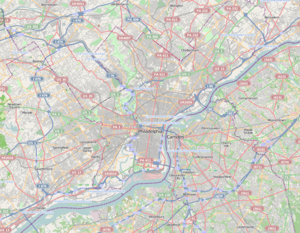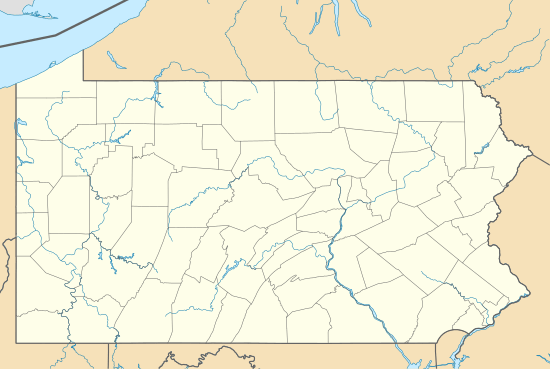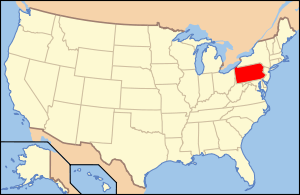Wyck House
|
Wyck House | |
 | |
   | |
| Location |
6026 Germantown Avenue Germantown, Philadelphia, Pennsylvania, United States |
|---|---|
| Coordinates | 40°1′18″N 75°10′43″W / 40.02167°N 75.17861°WCoordinates: 40°1′18″N 75°10′43″W / 40.02167°N 75.17861°W |
| Area | 2 1⁄2 acres (1.0 ha) |
| Architect | William Strickland |
| NRHP Reference # | 71000736[1] |
| Added to NRHP | October 26, 1971[2] |
The Wyck House, also called the Haines House and the Hans Millan House, is a historic mansion, museum, garden, and home farm in the Germantown section of Philadelphia, Pennsylvania. It was recognized as a National Historic Landmark in 1971; it is a contributing property of the Colonial Germantown Historic District.
History
Wyck's earliest owner was Hans Millan, a Quaker who came from Germany and was a descendant of a Swiss Mennonite family in 1690. His daughter, Margaret, married a Dutch Quaker named Dirk Jansen, a linen weaver who prospered in the first half of the 18th century. By the time of his death, he was listed as a gentleman and had Anglicized his name to Dirk Johnson. Their daughter, Catherine, married Caspar Wistar, a German who became a Quaker and amassed a sizable fortune as a button maker, glassmaker and investor in land.
In the next generation, Margaret Wistar married Reuben Haines I, a brewer and merchant of English descent. Their son Caspar Wistar Haines continued the family businesses and married Hannah Marshall, a member of another Quaker family. Wyck then passed to Reuben Haines III and Jane Bowne Haines. Reuben Haines was involved in the founding of the Eastern State Penitentiary, Franklin Institute, and American Philosophical Society. Wyck was passed to their youngest daughter, Jane Reuben Haines, afterwards, who lived here until 1911, carefully preserving the house, furnishings and gardens.
Wyck served as a summer home until Reuben Haines III moved his family into it as their permanent residence. Shortly after this move, he hired his friend, William Strickland, to remodel the entire building. Reuben is also responsible for Wyck's name, as nobody with the last name Wyck ever married into the family. On one of his many travels, Reuben came across a landscape sketch of Wyck the Seat of Richard Haines esq. Believing that Richard Haines was a relative, Reuben brought the sketch back to his house, and started calling his own home Wyck. It was later revealed that Reuben's family had no connection to this Richard Haines fellow, but the name stuck.
In the eighth generation, Jane B. Haines founded the first school of horticulture for women, the Pennsylvania School of Horticulture for Women, which is now Temple Ambler, and one brother, Caspar, helped design the Mexican railway system; while another, Robert, invented a gauge for measuring steel in rolling mills.
The last owners, Robert and Mary Haines, were fruit growers; Robert patented a device to press apples for a more natural tasting juice. In 1973, Mary Troth Haines donated Wyck to Historical Germantown. Wyck's family descendants are still very involved in the life of their home and community.

Today, Wyck is maintained as a house museum. The gardens are known for their collection of old roses, including 30 varieties, and the home farm has become a staple of the community. Wyck Historic House, Garden, and Farm is open to the public on Thursdays, Fridays, and Saturdays, from 12 to 4. They also have a weekly farmer's market on Fridays from 2 to 6.
Architecture
Wyck is an architecturally innovative house with an old-fashioned skin. From the outside it appears colonial in plan and design with some fashionable accents such as the late 18th-century whitewashed stucco.
The house is actually an accumulation of 18th-century parts: the hall (c. 1700–20), the front parlor (1736) and the library and dining room from (1771–73, which replaced a c. 1690 log structure.)
The house has been little altered since 1824, when Philadelphia architect William Strickland dramatically rearranged its interior spaces to create an open plan, allowing light to flood each room and bringing the pleasures of the garden inside. Strickland also added a set of "folding doors", which swing on a 90 degree angle, allowing the owners to close off two rooms with only one door.
Education at Wyck
Wyck offers a variety of educational programs for school groups, including environmental education, programs that focus on history of Quakerism, Native Americans, Colonial life, and Philadelphia. These programs foster literacy and writing while offering children activities such as arts and crafts and gardening.
Home farm
For more than 250 years, Wyck existed as a working farm, a legacy that continues today with Wyck's Home Farm, established in 2007. There are large vegetable and herb gardens, strawberry and raspberry beds, gooseberries and blueberries, along with fruit trees, an asparagus bed, a cutting garden, and a large grape arbor. Wyck is also home to several beehives. The various gardens are managed using traditional gardening techniques, with no synthetic chemicals used. Produce from the farm is sold at a seasonal, on-site weekly farmers' market.
See also
References
- ↑ National Park Service (2007-01-23). "National Register Information System". National Register of Historic Places. National Park Service.
- ↑ Listing at the National Park Service
External links
- Official website
- Wyck House at the Historic American Buildings Survey
- Listing at Philadelphia Architects and Buildings

